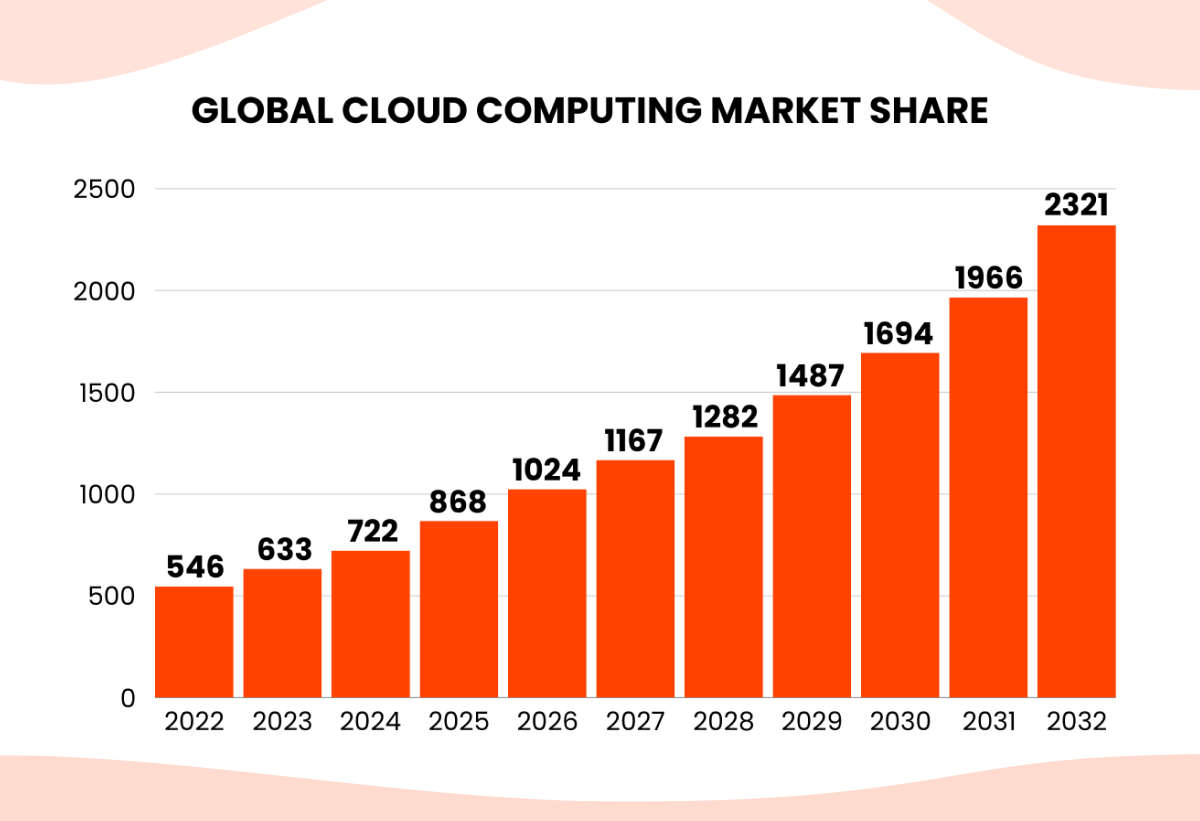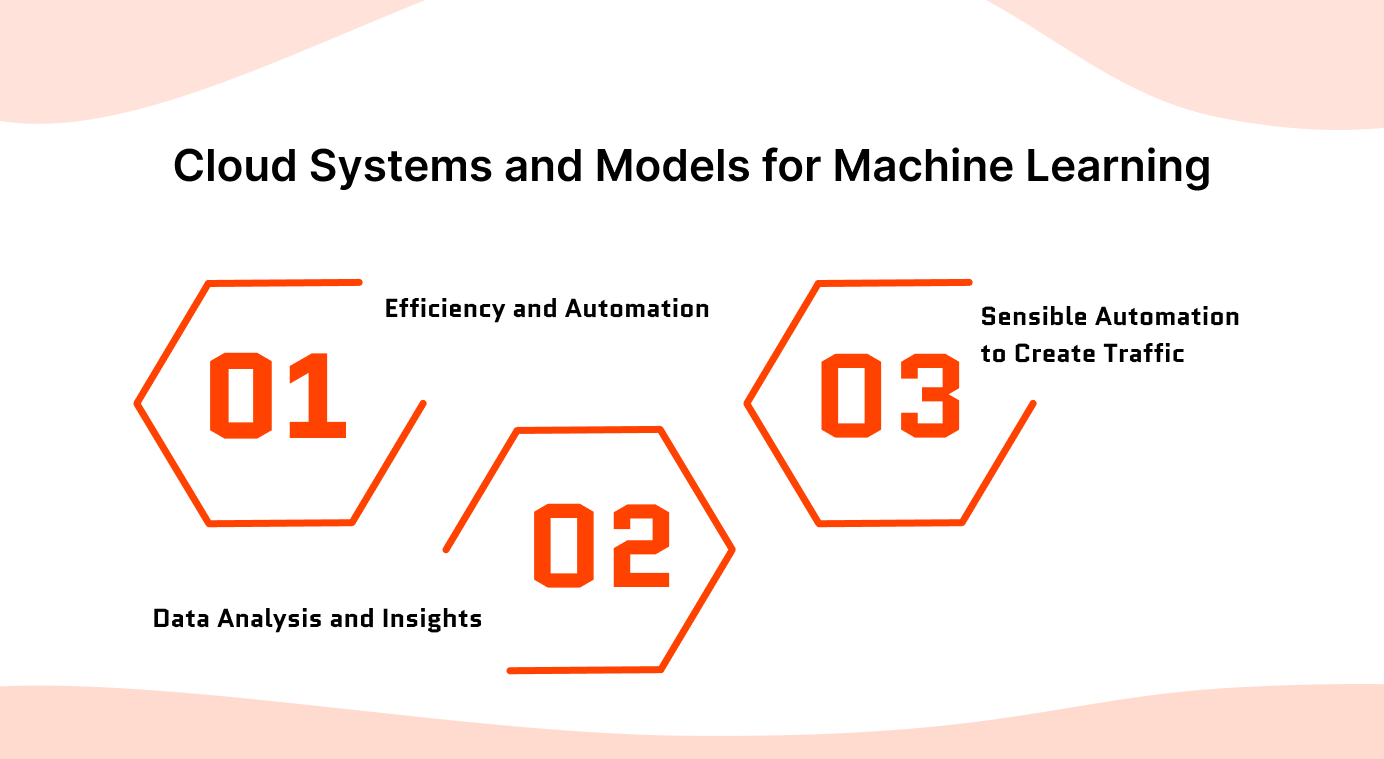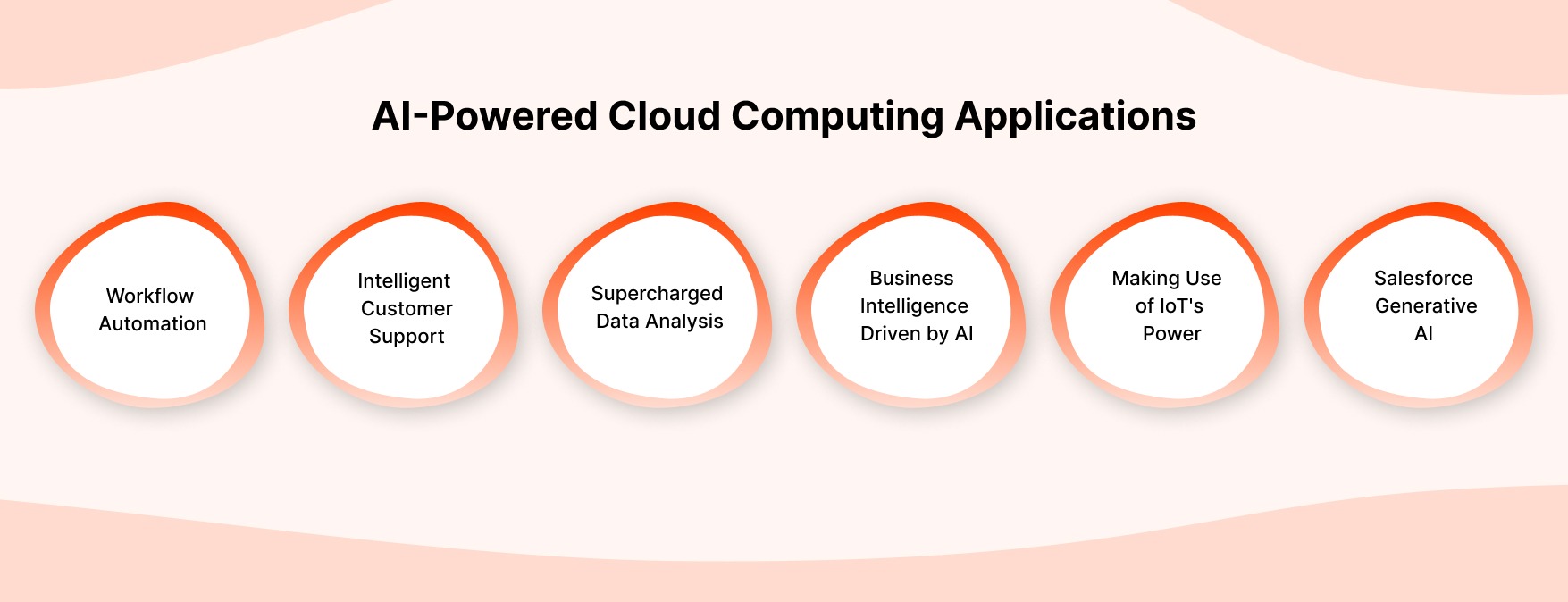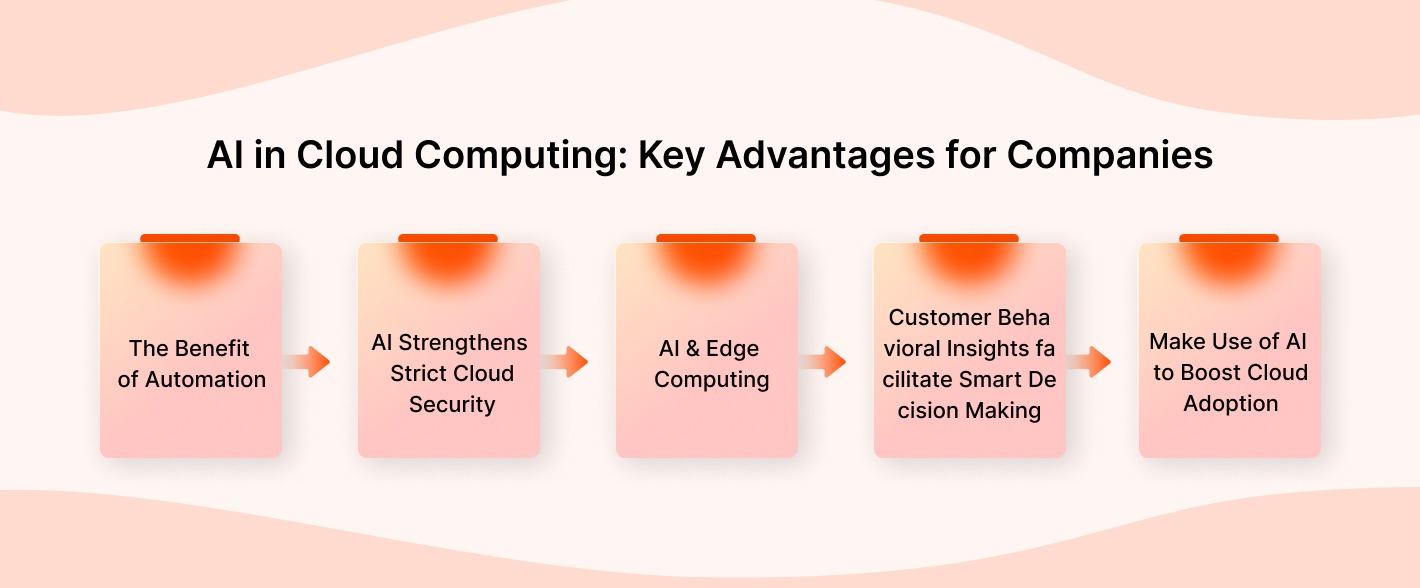The Significant Role of AI in Cloud Computing: An Easy Guide to Read

Feeling like there isn’t enough stuff on Netflix or Amazon Prime Video after spending countless hours scrolling through their offerings? And after a while, you are taken aback by a program that you adore.
Consider a different scenario in which you are looking for a new pair of running shoes, and advertisements for them appear wherever you go.
All of this is taking place on an artificial intelligence-powered system. By 2026, 36% of businesses worldwide want to use cloud-based AI. Sounds amazing. But wait a minute. Is it a sufficient number? Are the other 64% losing out on anything?
The industry and banking sectors are avaricious when it comes to artificial intelligence solutions. Businesses assert that these large-scale AI applications are trained and executed on the Cloud. The crucial question is this: Can your present cloud infrastructure handle the workload? (Warning of spoilers: Many still need to arrive.)
To be honest, artificial intelligence is a game-changer. According to a McKinsey survey, 60% of companies have already started AI projects, and 80% of enterprises think it will significantly influence them in the near future. (The next significant step might be this connectivity with the Cloud.)
This blog is enhanced with information on how artificial intelligence (AI) is revolutionizing cloud computing. Discover how this innovative team transforms operations and presents ground-breaking AI solutions.
Statistics for Cloud Computing and AI
- Globally, the cloud computing market will surpass $1 trillion by 2028. (Precedence Research)
- The global cloud computing market grew from $24.63 billion in 2010 to $156.4 billion in 2020. That’s a 635% jump.
- Over 20% of organizations say they have little to no idea how much different aspects of their business cost as it relates to the cloud (CloudZero, The State of Cloud Cost in 2024)
- A cloud bill can comprise hundreds of millions or billions of rows of data (FinOps Certification)
- An Amazon Cost & Usage Report is too large to load into Excel all at once. Instead, Amazon splits its monthly CUR into many separate files. Good luck understanding them. (FinOps Certification)
- 97% of enterprise cloud apps are unsanctioned, because departments, teams, or employees purchase new tools to support their productivity efforts. (Osterman Research)

The Relationship Between Cloud Computing and AI
Cloud computing and artificial intelligence have synced so effectively in the last several years because of their same automation foundation. AI takes care of all those repetitive chores, giving your IT staff more time to concentrate on innovative ideas.
The problem with AI, however, is that it needs a strong foundation to develop. On the other hand, cloud computing provides the ideal framework for these AI applications to thrive in this situation. Why? The Cloud offers AI algorithms the strength (computing power), the flexibility (scalability), and the storage space (data!).
According to a recent Deloitte report, approximately 70% of businesses are using cloud-based software to become AI-efficient. This pattern is followed even by cloud service providers like Microsoft Azure and Amazon. To enable clients to take advantage of the AI + Cloud revolution, they have already sent teams to construct a sizable library of AI algorithms.
The Development of AI and How It Affects the Cloud
Artificial Intelligence (AI) is becoming more and more prevalent, and 2023 has seen incredible technological breakthroughs. In 2024, automation and machine learning are poised to take the technology industry by storm.
Large corporations imposed a dramatic change in trend even as they joined the AI revolution in 2022. By 2025, 80% of retail executives want to use AI for automation, with the technology being twice as lucrative in more prominent companies. This quick change is because AI is finally developing, passing the prototype stage, and becoming more widely available to people.
Democratic AI Development: Constructing AI Devoid of Code
AI makes the promise that anybody can create and use AI models without a degree in computer science. AI service companies prioritize user-centric growth, spearheaded by technologies such as large language models (LLMs) like Gemini and ChatGPT. These intuitive user interfaces enable people and small enterprises to harness AI’s potential without the help of major IT companies. Open-source communities such as GitHub and Reddit are turning into veritable gold mines of instructional materials and readily available tools.
Do you recall 2022, when image-generation models were all the rage? While DALL-E 2 and Midjourney provided a good foundation, ChatGPT was a game-changing phenomenon. With good reason, businesses are rushing to incorporate this technology! A cybersecurity business called Wiz claims a rise in tools and services for AI development. This can only be accomplished via the Cloud.
Generative AI: A Benefit in the Growing AI Field
Cloud computing is ideal for generative AI. Massive processing power is needed to train and execute these models, and the Cloud’s unparalleled scalability makes it an excellent choice for this task.
Businesses Make Use of Managed AI in Cloud Environments
According to Wiz’s study, managed AI services like Salesforce’s Generative AI for CRM, Google Cloud’s Vertex AI, Amazon SageMaker, and Azure OpenAI Service are already used in over 70% of cloud settings.
That’s a greater rate of adoption than the ubiquitous Kubernetes container orchestration software, which is essential to contemporary corporate applications! These figures indicate that cloud-based AI services are expanding at a very rapid pace.
The problem is that even while AI adoption is firm, 32% of businesses still need to be in the experimental stage. This indicates that many still need to deploy AI scalably.
Companies like Alphabet, Amazon, IBM, and Netflix have already incorporated AI into their operations, demonstrating the enormous potential of artificial intelligence. However, knowledge of cloud computing and AI is necessary to implement AI properly. With the possibility of several failures, you may assemble and educate your services, which is an additional choice to close the knowledge gap and guarantee successful deployment in line with your company’s requirements.
Thus, the issue still stands: Will your company use cloud-based AI?
To learn more about the growing importance of AI in cloud computing, continue reading the next section.
To what extent has AI changed cloud computing so far?
AI is now a multipurpose tool for Cloud customers, helping with data management, security, analysis, strategic decision-making, and automating activities. It grasped the capacity to use machine learning and provide:
- Objective interpretations of data-driven insights.
- Increasing these procedures’ efficiency.
- Saving the business a substantial amount of money.
Utilizing AI software built on machine learning algorithms in cloud settings allows companies to provide users and consumers with connected, user-friendly experiences. This not only enhances user satisfaction but also underscores the positive impact of AI in cloud computing, leaving the audience content with its potential.
Cloud Systems and Models for Machine Learning

Machine learning models consist of large datasets, which may be raw, unstructured, or organized and require powerful CPUs and GPUs for processing. These datasets are used to train algorithms.
On the other hand, cloud systems—public, private, or hybrid—provide the necessary capacity and can meet all of the impending computing needs.
Cloud computing also makes ML-related services like serverless computing, batch processing, and container orchestration possible. These services provide scalable and adequate infrastructure, further expanding AI’s potential in the Cloud.
The development of AI models has made it possible for cloud users to investigate fresh angles and fortify the foundations for enterprises to expand rapidly:
Here are some ways that AI has affected the field of cloud computing:
Efficiency and Automation:
Cloud-based AI and these two words go hand in hand. Artificial intelligence (AI) software offers a cloud environment that enables customers and users to have intuitive and linked experiences, whether via process automation, eliminating human mistakes, or enhancing efficiency. Businesses may boost production and cost efficiency by implementing AI into their cloud infrastructure with the assistance of cloud computing consulting services providers.
Data Analysis and Insights
The potential for in-depth analysis and dataset structure, which arise from the combination of cloud computing with AI algorithms, provides a long-term roadmap for cloud migration and transformations. This massive amount of data must be processed by CPUs and GPUs. Experts advise that the best possible mix of private, public, and hybrid clouds helps AI algorithms translate complicated data into easy-to-understand insights.
Sensible Automation to Create Traffic
Businesses are becoming more intelligent via intelligent automation, particularly in terms of increasing internet traffic. By using AI and automation solutions, you can quickly monitor user behavior and improve content based on trends and tailored experiences to draw in and keep visitors. By producing relevant content, tailoring user experiences, and optimizing search engines, artificial intelligence (AI) automates traffic creation. It increases website traffic, conversions, and growth by using chatbots to engage users and deliver high-impact advertisements.
Working with a cloud expert gives you access to a group of specialists who can guide you through the challenges of developing cloud applications and help you harness the Cloud’s revolutionary potential for your company.
Cloud Computing and Artificial Intelligence: A Mutually Beneficial Relationship Influencing Market Dynamics
Anticipating the present artificial intelligence sector in cloud computing is a huge leap. These two are a formidable combo that helps businesses thrive by promoting strong security, adaptability, scalability, and cost-effectiveness.
Adaptability at Your Disposal:
Given that most workers choose remote work, there is a spike in demand for cloud-based apps. Due to the continuously rising demand, flexibility and security are highly valued, which encourages businesses to create cloud apps with AI capabilities.
These apps provide cost-saving features, enhanced client satisfaction, and durability. Businesses are eager to expand their cloud services to improve user experience, increase traffic, and guarantee reliable disaster recovery and contingency plans.
Reaching New Elevations while Saving Money
The days of costly on-premise infrastructure are long gone. Pay-as-you-go models for cloud-based AI make state-of-the-art AI technologies available to companies of all sizes. This maximizes your return on investment by enabling you to grow your AI activities efficiently and economically.
Edge Computing with Artificial Intelligence:
Edge computing, when combined with artificial intelligence algorithms, makes real-time data processing without reliance on cloud infrastructure possible. These algorithms enable direct deployment on local devices such as sensors or Internet of Things (IoT) devices. By combining edge computing with AI, data may be analyzed at the network edge, and instantaneous feedback is produced. Edge artificial intelligence is used by technologies such as wearables, security cameras, self-driving vehicles, and smart home appliances to provide real-time information.
Artificial Intelligence in Edge Computing reduces reliance on continuous internet access, enhancing security and dependability. Local data processing also reduces the possibility of sending sensitive data to the Cloud.
Furthermore, by locally processing data, AI at the edge enables tailored user experiences. While fitness trackers provide real-time coaching based on individual exercise data, intelligent retail establishments may adjust product suggestions depending on each customer’s purchasing history.

Safe and Reliable as Essential Component for Effective Scaling
For a cloud system, security and dependability are the two main requirements. With sophisticated AI algorithms that evaluate enormous volumes of data to detect and counter security threats in real time, artificial intelligence in the Cloud fortifies your defenses and protects your data and systems.
Quantum Computing
Quantum computing is the use of quantum mechanics principles to tackle difficult problems that conventional computers are unable to handle. These computers use multidimensional quantum algorithms and operate on qubits to solve issues. When combined with AI capabilities, quantum computing can use its processing prowess and more intelligent algorithms to revolutionize routine business procedures for a variety of sectors.
Large datasets can be processed by quantum computers more quickly than by traditional computers, which might hasten the development of AI. By allowing algorithms to more efficiently use correlations between variables, quantum entanglement expands the capabilities of artificial intelligence (AI) beyond traditional limitations. This capacity extends to the large-scale development of more effective AI systems because quantum computing can handle complicated calculations that are difficult for conventional systems to do.
Green AI and Sustainability
AI will already tell intelligent tales efficiently in the future. However, it also offers yet another story about environmental accountability. As a branch of sustainable AI, green AI focuses on creating and using AI to produce optimized hardware and energy-efficient models, which lessens AI’s environmental impact while simultaneously creating opportunities for its use in sustainability initiatives. Imagine an artificial intelligence (AI)- –driven system that tracks deforestation trends, forecasts harsh weather, and maximizes renewable energy generation. By appropriately using AI, businesses can create a future that is both technologically sophisticated and ecologically sustainable.
Green AI incorporates environmental awareness, which has a positive effect on many industries and helps to create a sustainable future. AI in healthcare improves the precision of medical imaging, lowers the need for further testing and radiation exposure, speeds up drug development by foreseeing molecular environmental impact, and maximizes risk management for sustainable investments by quickly identifying and stopping fraud.
AI-Powered Cloud Computing Applications
Businesses may benefit from cloud computing’s scalability and flexibility, but AI adds another level of capability. Here are a few essential uses of artificial intelligence in cloud computing, coupled with an illustration of Salesforce Generative AI:
Workflow Automation (AI as a Service, or AIaaS):
AIaaS is provided by cloud computing platforms such as Google Cloud Platform (GCP) and Azure, which let you train machine learning models for automated tasks. For example, an e-commerce business utilizes AIaaS to automatically customize product suggestions based on a customer’s browsing history.
Intelligent Customer Support (Chatbots Driven by AI):
Natural language processing (NLP), the foundation of chatbots, allows for text, voice, or image-based interaction. Chatbots gather essential consumer data, respond to FAQs, and provide round-the-clock customer service. They run on cloud platforms, which provide the resources needed for efficient operation.
Supercharged Data Analysis using Cloud Computing with Cognition:
This emerging subject creates platforms with thinking and learning skills similar to those of humans by fusing cloud computing with artificial intelligence. IBM’s Cognitive Insights Platform analyzes massive data sets to find trends and patterns and support businesses in making data-driven choices.

Business Intelligence (BI) Driven by AI:
AI’s presence also boosted business intelligence. It gathers market data automatically, analyzes consumer behavior, and spots patterns among rivals. Cloud computing provides the processing power needed for AI models to convert data into useful insights.
Making Use of IoT’s (AI for Internet of Things) Power:
IoT device data is managed using artificial intelligence. With Cloud-based AI, you can use machine learning models to gather and interpret data from sensors and devices directly. This makes it possible to mine your connected devices for valuable insights via data analysis, modeling, and manipulation.
Salesforce Generative Artificial Intelligence:
To give organizations an extra edge and enhance the client lifecycle, Salesforce introduced its own AI for CRM and joined the Generative AI movement. Salesforce Sales GPT is an AI-powered innovation that uses customer data to improve product descriptions, create tailored sales letters, and assign lead qualification ratings.
AI in Cloud Computing: Key Advantages for Companies
When used correctly, cloud computing and artificial intelligence may completely transform any organization. AI may operate more effectively by using the Cloud’s enormous processing capacity and scalability, which has many benefits for organizations. These benefits include:
The Benefit of Automation
The foundation that maintains the connection between AI and cloud computing is automation. Modern AI technologies, driven by machine learning’s capabilities and algorithms, automate a multitude of tasks, boosting IT workers’ productivity and freeing them up to pursue more creative and strategic endeavors.
According to a Forbes report, 92% of companies believe that cloud computing plays a big part in enabling AI-powered automation in standard business procedures. With its extensive algorithm distribution methods and the knowledge of top cloud service providers providing a broad range of AI-focused products and services, cloud computing is exploding in the market. Chatbot assistants provide the greatest illustration of AI automation that helps companies speed up client interactions.
AI Strengthens Strict Cloud Security
Cloud security was always a concern, like that sneaking suspicion that you should have locked the door. AI, however, is altering the rules. Artificial Intelligence (AI)-driven security solutions function as watchdogs, sifting through vast volumes of network traffic to identify unusual behavior before it escalates into a severe breach.
The trick is that AI learns from dangers rather than just scanning for them. The system becomes more sophisticated and capable of handling even the most cutting-edge cyber threats with each new assault attempt. This provides you peace of mind by ensuring your sensitive data and applications are constantly and proactively protected.

AI & Edge Computing
Even now, many IT specialists still want to analyze data across systems as soon as it’s created at breakneck speed. AI and edge computing are to blame for this. By processing data closer to its sources, edge computing reduces the latency associated with data transmission. Next, include the AI’s power layer. AI algorithms are constantly scuttling about these edge devices, guaranteeing (without depending on the Cloud) real-time data analysis and strategic decision-making.
For applications where speed and dependability are essential, this does, in fact, turn the tables. Imagine autonomous vehicles that make snap judgments based on real-time sensor data or manufacturing robots that modify operations in response to instant machine readings. Edge AI reduces latency and guarantees the seamless operation of crucial operations in these situations by eliminating the need to transmit data back and forth.
Customer Behavioral Insights facilitate Smart Decision Making
AI is becoming capable of more than just managing data. While it has come a long way from gathering, storing, and evaluating massive quantities of data, its real power is its capacity to provide an in-depth understanding of consumer behavior.
AI creates an intricate portrait of your clients by examining trends in both historical and current data. By developing a better grasp of your target audience’s requirements and preferences, you may optimize the effect of your marketing activities. Envision content that really connects with your audience, tailored suggestions, and targeted advertisements—all fueled by AI analytics.
Predictive analytics is the foundation of effective cloud-based systems, and AI may significantly improve it. By analyzing large datasets, AI can predict future trends and client behavior, enabling you to make more educated choices and increase productivity.
Make Use of AI to Boost Cloud Adoption
AI workloads are always looking for resources, such as continuous processing power, sophisticated algorithms, and large datasets. During these periods, the Cloud is the best platform to host AI applications due to its built-in scalability and computational power.
Businesses increasingly turn to the Cloud by adopting AI-powered solutions like chatbots and sophisticated analytics tools. Conventional on-premise infrastructure must keep up with AI’s constantly expanding requirements. Hardware scaling may be costly and time-consuming, which stifles innovation.
The Cloud removes these obstacles. Businesses may use the Cloud to scale resources up or down as required, giving their AI applications the capacity to operate without a hitch. When paired with the Cloud’s affordability, this flexibility makes it an obvious choice for companies wishing to use AI to its fullest.
Six Ethical AI Project Considerations: Creating Reliable AI
Concentrating on the ethical advancement of artificial intelligence (AI) as it develops and becomes increasingly integrated into many businesses is more crucial than ever. Seven moral factors for AI projects are as follows:
Equity and Prejudice:
Due to their training, AI models have the potential to reinforce preconceived notions, which might result in unfair employment procedures, face recognition, or loan approval processes. To prevent such situations, it is advised to utilize a variety of datasets, use fairness measures when developing models, and regularly audit models for any biases.
Openness:
There are still many AI models at the pilot stage, which begs many concerns about how AI systems make essential judgments. These days, projects aim to be explainable, enabling people to understand the logic behind an artificial intelligence system’s output. This guarantees that whatever artificial intelligence model you use doesn’t abuse users’ trust and allows them to see any biases or mistakes before they have a chance to cause trouble.
Personal Space
Many companies continue to doubt AI’s ability to protect consumer privacy. Businesses that handle large volumes of data must be careful to follow data security laws, obtain informed permission from data subjects, and anonymize sensitive information where possible.

Explainability:
Explainability is similar to transparency in that it focuses on comprehending the decision-making process of AI systems since it ultimately comes down to responsibility and trust-building. Gaining consumers’ trust may be facilitated by using XAI (Explainable AI) methodologies, recording the rationale behind AI choices, and offering users concise explanations upon request.
Human Supervision:
AI programs shouldn’t function in total isolation. Human supervision is crucial to guarantee the appropriate use of AI and to step in when needed. Experts advise defining precise roles and duties for human supervision in AI projects and developing procedures for human involvement when ethical judgment is required in AI judgments.
Credibility:
Developing and implementing AI requires careful consideration of the need to foster a culture of accountability. Everybody participating in the AI endeavor, from consumers and regulators to developers and deployers, has to be conscious of their ethical obligations. Continue your proactive evaluations to find any dangers linked to the AI system, taking into account social effects, biases, and unforeseen outcomes.
Conclusion
The future of business is here and now, not some far-off horizon. Cloud computing and AI are the technologies revolutionizing enterprises of all kinds; they are no longer future ideas. Accepting this potent combo will help you advance rather than merely stay current.
Provide your team with a workplace where repetitive processes are automated, client interactions are tailored, and data is turned into your most valuable resource. That world is within your grasp when we partner with cloud consulting services. We’ll guide you through the fascinating potential of cloud computing and artificial intelligence, facilitating a seamless transition and optimizing your return on investment.
Frequently Asked Questions
What role does AI play in cloud computing?
AI plays a crucial role in enhancing cloud computing by automating tasks, optimizing resource allocation, and improving overall efficiency. Additionally, it contributes to enhancing cloud security and providing valuable insights through intelligent analytics.
How does AI contribute to operational efficiency in cloud computing?
AI contributes to operational efficiency in cloud computing by automating tasks, freeing up IT teams to focus on strategic operations, leading to increased productivity and improved service delivery.
What are the benefits of hybrid cloud solutions powered by AI?
AI-powered hybrid cloud solutions provide businesses with diverse options, seamless integration, and scalability, allowing them to meet market demands and drive innovation.


